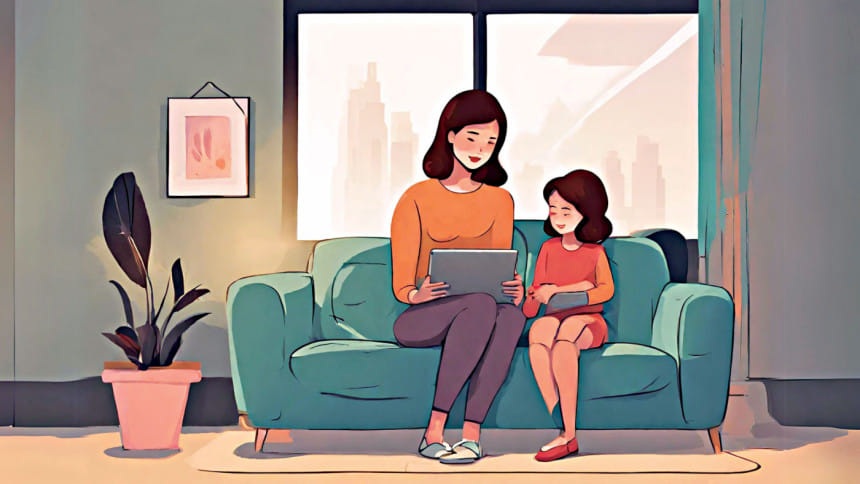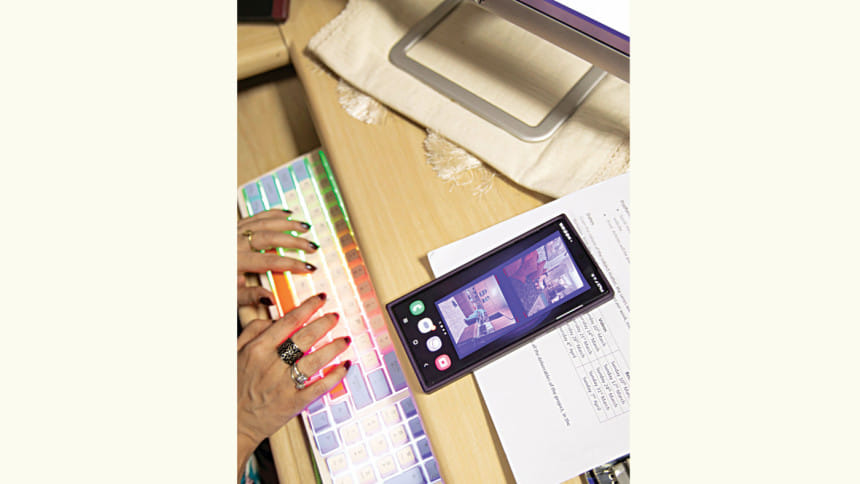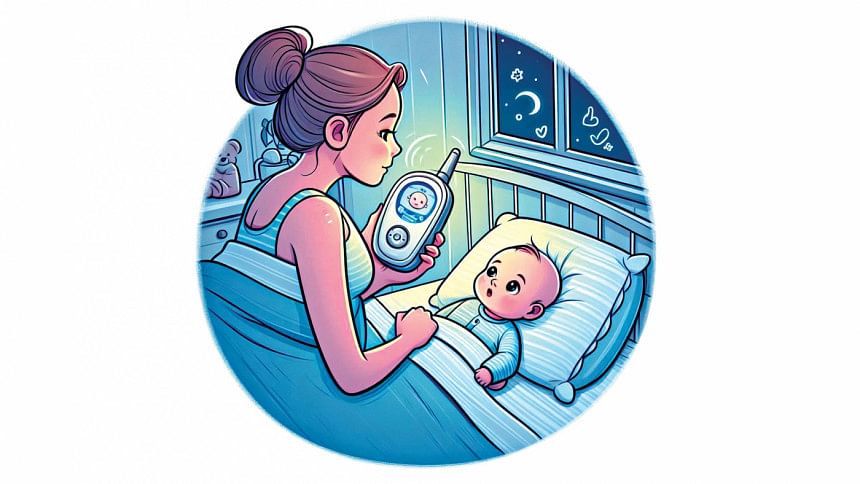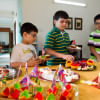Imagine the birth of a baby. Almost as soon as it opens its eyes, it finds itself staring into a camera. When it goes home, it finds the bedroom temperature perfectly adjusted to suit its requirements. The bath water is neither too hot nor too cold. Its bottles come sterilised, and warmed for optimum comfort and when it sleeps in its own room, parents are comforted by the gentle rise and fall of its chest as seen from the baby monitor. If one of the parents must step out for a bit, they can log onto the nanny cam installed at home through their phones and see the precious little face that they miss so much.
There's no denying that all of this comes from a place of love. The hygiene, the comfort, and the constant monitoring. There's a silver lining for the parents too, stay-at-home parents can have their hands free for at least a few hours in the day to unwind, or finish their work, and working parents can return to work, confident in the knowledge that their little one is safe and comfortable.
From bottle sterilisers to baby monitors and nanny cams — there's no discounting the fact that technology has made life much easier for parents. However, in an era of such pervasive innovation, when is it time to pull back and say, enough?

The sneakiness of technology
When Taneem, a mother of a six-month-old, was about to finish her maternity break and go back to work, the only thing that helped her through the painful transition was the nanny cam.
"I needed to feel in control. Staying away from my daughter for so long seemed impossible in the beginning. The nanny cam was a boon in the sense that I could log in to see my daughter whenever I felt low, and instantly feel a little more relaxed!" she says.
While the above may paint a rosy picture in your brain, technology is stealthy in the way that it makes the user complacent. Although parents need their downtime, too much reliance on the baby monitor or the electric rocker can rob the baby of one of the most precious gifts a parent can give it — their touch and physical closeness.
According to BetterHelp child counsellor, Farhat Hasan, each child goes through a number of developmental stages while growing up and has unique needs that must be met in each of them.
"Almost as soon as a child gets a heartbeat, its brain starts to develop. Parents, therefore, should educate themselves on children's developmental stages even before their child is born. If they make necessary lifestyle changes from the beginning, they are better prepared to provide what their child needs in order to stimulate their brains," says Hasan.
Previously, households had grandparents, aunts and uncles living together under one roof and everyone in the family would take responsibility for a child's upbringing. Now, due to the change in family dynamics, the choice for help in child rearing has come down to two alternatives — house help or technology.
"It's a matter of choosing the lesser of the two evils and technology gets an upper hand over house help. But in no way is this an ideal environment for a child to grow up in," warns Farhat Hasan.

Working with technology
Hasan warns parents of the dangers of social anxiety, especially when children are left with devices, unsupervised, for long periods of time. "Children must be empowered to naturally interact with humans, or else they will shy away from interaction every time. This will invariably pull them back and hinder their growth."
On the other hand, a strict no-screens policy imposed by parents is equally unrealistic. As a child grows up, they are exposed to technology in schools and other people's homes.
"It's the modern age and there's no escaping the screen," shares Hasan.
"Keeping a child away from screens completely can actually give rise to inferiority complexes in them." She recommended using technology wisely during this time, with parental interaction and supervision. "This sort of an interaction reduces social anxiety in children as they grow up," informs the counsellor.
Using screens during meal times is a common scenario for households with young children in Bangladesh. "My son is three," says Seher Chawdhry, a stay-at-home mother. "I struggled to feed him his veggies for the last two years, but ever since I've turned on the screen, mealtimes have become easier. Veggies, fruits, everything goes in when he's distracted!"
Nutrition is undoubtedly one of the most important requirements for a child, but does this sly approach cause more harm than good?
While parents are not wrong to want their children to eat their veggies, they would do well to understand that sneaking food into children causes them to form unhealthy relationships with food. Not only that, but it also skips over a crucial development stage for children.
"Parents should not have to feed a child beyond a certain point. Being able to hold a fork and spoon allows children autonomy, making them self-assured. Let them make a mess — they will apply different techniques each time they approach food, in order to not make that mess the next time. This is natural learning, which can quickly lose steam if the child is focused on the screen, instead of on eating," Hasan says.

Screen time
Most parents worry about the time their children spend on screens, wonder how much of their lives they are sharing with strangers, and lose sleep over cyberbullying and other such mysteries of the World Wide Web that they do not want their children navigating alone.
In an attempt to limit their screen time, parents often use technology as a privilege to take away beyond a certain time, set timers and introduce cell phones. Not many, however, turn an introspective eye inwards, to check whether their children's unhealthy obsession with gadgets has anything to do with how they themselves use their devices.
Children often want uninterrupted time and conversations with their parents. What they get is a better-than-nothing alternative, in the form of stunted communication, punctuated by regular pings and alerts from phones. When they see parents attending to these in the middle of their conversation, they are discouraged to repeat their interaction and turn to the internet for the connections they fail to receive from their parents.
A study in the Journal of Developmental and Behavioral Pediatrics found that parents' excessive use of technology may not only steal precious learning opportunities from families but may also cause conflicts and tension at home. As electronic devices blur the lines between work and personal time, family life, especially one with children in it, suffers.

Physical vs mental balance
A dreaded by-product of over-exposure to technology, for children of all ages, is the imbalance that it causes in their mental and physical stimulation.
"Screen times interfere with the physical outlet that a child needs, in order to grow stronger and sharper. This automatically creates an environment that would foster stress and anxiety in our little ones," informs Farhat Hasan, child counsellor at BetterHelp.
The counsellor strongly felt that a comprehensive approach must be adopted to bring about a balance between the physical and mental outlet that a child is supposed to receive for optimum growth and development. "A seven-year-old child who does his or her own chores does not get time for screens, nor should a child living with or around grandparents, as they are constantly interacting with people of different ages and remaining active."
The apparent lack of green spaces, in Dhaka particularly, does pose a challenge for parents as they struggle to find ways to allow their children a physical channel to release their energy, have positive learning experiences and tire out their little bodies.
"Dance!" says Hasan. "Children love to dance and you can have a short, thirty-minute dance party with them." According to the expert, creating moments like these provides children with more than just a physical outlet. "They get one-on-one time from parents, their confidence level is strengthened, they sleep better, their eating habits mature, and their gut health improves as well. It's a gift that keeps on giving."
Pre-teens and the war on privacy
The problem with screens, especially portable ones, is that they draw you in. On the other hand, they are so ubiquitous that it is difficult to turn away from them. Ever since schools have introduced the concept of online classes in earnest during COVID-19, sensitive age groups of children, such as pre-teens, have had to keep these devices close to them for long periods. This has led to a higher dependency on screens than ever before.
"My daughter wants privacy and I'd like to respect that," says Nameera Kabir, mother to a thirteen-year-old. "But I hate to imagine what evils she's exposing herself to. I wish I could do more than just speak to her about my concerns because she carelessly brushes them off."
While pre-teens and teens have a general understanding of good and bad content, what they struggle with is an overload of information. There is a lot on the internet but not all of it is good, or even relevant. "Parental role is important here. Trying to initiate a conversation with children without prying, and more so, without judging, is an art that must be mastered in order to connect with children of this age. The more comforting they find your presence, the more open they will be about their experiences — including those with technology," Hasan opines.
From a very young age, children pick up on comparisons and begin to develop complexes of their own. Owing to hormonal developments and major changes in personality, teens and pre-teens feel these pressures a lot more. Social media and the make-believe world of influencers serve to add fuel to the fire.
"It is up to parents to refill their emotional bank balance. Give them back what technology threatens to take," advises Farhat Hasan.
"Have novel experiences with them, teach them skills and give them regular boosts of confidence to master them. The more they know how fulfilled they are as individuals, the less dependent they will be on screens and other detrimental forms of technology," she concludes.
Photo: Sazzad Ibne Sayed Illustration: LS







Comments